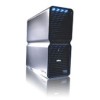Dell XPS 700 Jet Black Owner's Manual - Page 134
Enables or disables Execute Disable Memory Protection technology.
 |
View all Dell XPS 700 Jet Black manuals
Add to My Manuals
Save this manual to your list of manuals |
Page 134 highlights
CPU Clock Speed HDD Acoustic Mode (Bypass default) Security Admin Password (Not Set default) System Password (Not Set default) Password Changes (Unlocked default) Execute Disable (On default) Power Management AC Recovery (Off default) Provides limited capability to adjust the CPU clock speed so that the CPU operates at a different frequency than that designated in the manufacturer's design specifications. NOTICE: Dell does not recommend operating the CPU at a frequency that is greater than the manufacturer's design specifications (also referred to as over-clocking). Operating the CPU in this manner may cause your system to shut down unexpectedly, may result in a loss of data, and may reduce the operational life of the processor. If the system shuts down unexpectedly or is unstable, select a lower CPU operating frequency. NOTE: Press to return the processor back to the default setting. Determines the acoustic mode at which the hard drive operates. • Bypass - Do nothing (needed for older drives). • Quiet - The hard drive operates at its most quiet setting. • Suggested - Allow the hard drive manufacturer to select the mode. • Performance - The hard drive operates at its maximum speed. NOTE: Switching to performance mode may cause an increase in noise produced by the drive, but does not affect the drive's performance. NOTE: Changing the acoustics setting does not alter your hard drive image. Used to prohibit an unauthorized user from changing any configuration settings in the system setup. Used to prohibit an unauthorized user from booting to the operating system. This option locks the system password field with the administrator (admin) password. NOTE: When the system password field is locked, you can no longer disable password security by pressing when the computer starts. Enables or disables Execute Disable Memory Protection technology. • Off - Execute Disable Memory Protection technology is disabled. • On - Execute Disable Memory Protection technology is enabled. Specifies how the computer will behave when AC power is restored after an AC power loss. • Off - The system stays off after AC power is restored. • On - The system powers on after AC power is restored. • Last - The system returns to the previous state after AC power is restored. 136 Appendix















